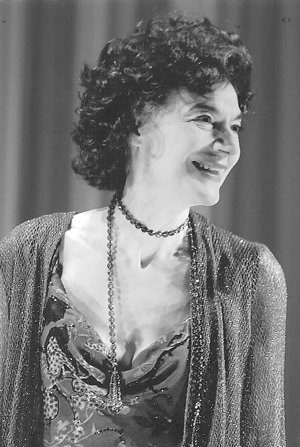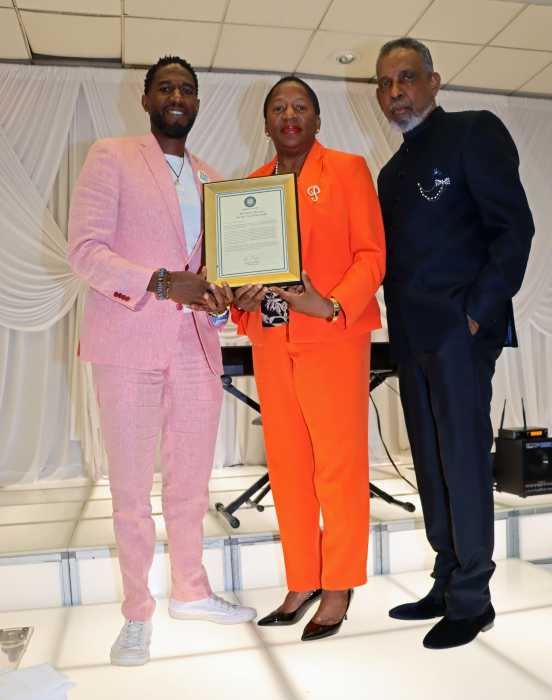Marian Seldes headlines star-studded cast in her latest stage turn
On Thursday evening, August 18, five days after her 77th birthday, Marian Seldes will make her character’s entrance down an aisle of a theater on East 59th Street, saying to the actor who portrays her driver, morphine supplier, and aide, “Gently, gently. You’re a sadist, Edward.”
Whether the name Edward is a tribute or not to a certain Edward Albee is something only Terrence McNally knows.
The drama before us is McNally’s latest, “Dedication or The Stuff of Dreams,” now in previews at the playhouse called 59E59. It will be by rough count the birthday girl’s 50th or 60th on-stage opening night in this city alone, along with God knows how many outside this city, or on television, or in films. Remember, this is the actress who for four years, from 1978 until late 1982, appeared in “Deathtrap” on Broadway without missing one single performance; who between 1974 and 1982 appeared in 179 episodes of “CBS Radio Mystery Theater.”
A few weeks before that 77th birthday, Marian Seldes, in the living room of her apartment overlooking Central Park, said, “I was told by many people when I was very young—by friends of my parents, for instance—that the last part of my life would be the most interesting. I think they told me that because, though I had an incredible childhood, I was so grown up even then.
“The comment never bothered me, and it turned out to be true. It is the best part of my life,” said the tall, willowy five-time Tony nominee, multiple Obie Award nominee, winner of one Tony, of a couple of Obies, a Drama Desk Award, all sorts of other encomiums, and about as gracious, generous, forward-looking, joyously dedicated an individual as ever worked in her profession.
“I know in films it gets difficult as people get older, but in my good fortune, it gets better. Professionally, everything. And certainly that’s true in the part I have now”—as Annabelle Willard—“a lonely, wealthy, irascible woman who’s dying, and who has something, a wonderful old theater, that two other people [Nathan Lane and Alison Fraser] want.”
The parents of Marian Seldes’ loving childhood were Gilbert Seldes, journalist, critic, author of “The Seven Lively Arts,” a seminal 1924 book that raised comic strips, jazz, movies, broadcasting, and more onto the map of culture, and Alice Hall Seldes of the Episcopalian blue-blooded Halls.
Alice’s stockbroker brother Richard had been the first husband of the much-married Dorothy Schiff who would later become owner and publisher of the New York Post – and would thus always be “Aunt Dorothy” to Marian herself.
“My parents met at [poet] John Peale Bishop’s wedding. My mother had gone to school at Brearley with Margaret, the girl he married. When my parents in turn got married, my grandmother was surprised”—delicate Marian Seldes locution—“because my father was Jewish. Then of course he became her favorite member of the whole family.
“Something that haunts me,” she said, “is that my father was 77 when he died,” in 1969, “and now I’m 76. My mother died at 55. You pass these milestones. So shocking to think of lives cut short. Whereas my Uncle George”—irreconcilably ultra-radical writer/publisher George Seldes—“lived to be 105. But he took better care of himself than my father did.”
What were your father’s sins?
“Oh, smoking, drinking, not exercising—all the things people now insist you do or not do. My father exercised his brain,” she said. With her sweet, grave smile: “I do floor exercises, because I have a bad back. But the theater is what makes me stay well – or should I say, makes me stay in condition.”
(The writer of this article worries that this is starting to sound like a wide-eyed magazine puff piece. On the other hand, the writer has known and cherished Marian Seldes for upwards of 40 years now; knew her father before her, and liked him a lot; had a speaking and interviewing relationship with her late husband Garson Kanin, as well as with the Ruth Gordon who preceded Marian as Mrs. Garson Kanin and was one of Marian’s lifelong heroines. This apartment in which we are sitting and talking was in fact Garson and Ruth’s before it was Garson and Marian’s.)
“The apartment in which I grew up was at 125 East 57th Street. Forty years I lived there. One Christmas in the late ’60s or early ’70s they tore the building down and put up a hideousness in its place. Look,” Seldes said, crossing the room and bringing back, in one hand, an ordinary red brick. “My daughter gave me this, salvaged from our old building.
“Well, because my father was a theater critic, he took my brother and me to plays all the time. And one of them was ‘The Three Sisters.’”
That was the 1942 production of the Chekhov masterpiece produced by and starring Katharine Cornell (as Masha) and directed by Cornell’s husband Guthrie McClintic.
“I thought she was wonderful, and when I graduated from the Dalton School I did not want to go to college but to be in theater, be an actress. Two people recommended me. The first one was Robert Edmond Jones”—the great producer, director, writer, set and lighting designer—“who was a friend of my parents, and whose book ‘The Dramatic Imagination’ is still the best there is. And the other was Guthrie McClintic, because my father had written a profile of Katharine Cornell for The New Yorker.”
She put the brick back in place.
“Being a grandmother is also sheer bliss. My grandchildren are 14, 16, and 19—all boys. Another wonderful thing abut being older is that it gives you distance. It makes you appreciate your parents more. My daughter picked up a picture, here, last night, and just looked at it, for a very long time. It shows me and my mother on the Atlantic City boardwalk.” She brought the photo over—two lovely females—for me to look at.
At just that instant, the phone rang. She went to answer it, listened, spoke, laughed, hung up, came back and said: “That was John Guare. I told him you were interviewing me. He said: ‘Tell him that playwrights are throwing themselves at your feet.’”
Marian’s first bit part in theater was as “Attendant to Medea” in the 1947 Robert Whitehead production of the Euripedes tragedy starring Judith Anderson, Florence Reed and John Gielgud, who also directed. There followed a small part in the 1949 road and Broadway McClintic-Cornell production of “That Lady,” a Kate O’Brien saga about Phillip of Spain and his lady.
In 1964, director Gielgud put her into his production of Edward Albee’s cryptic “Tiny Alice,” and in 1966 she won her Tony for her performance in Alan Schneider’s staging of Albee’s far less cryptic “A Delicate Balance.” Twenty-eight years later she would—“in my 60s”—give one of her most compelling, most brilliant performances as the middle figure, the one merely called “B,” of Albee’s play about his mother, “Three Tall Women,” at the Promenade Theater, Broadway and 76th Street. Six years after that she would turn delicious, if menacing comedienne opposite Brian Murray in Albee’s “The Play About the Baby” at the Century Center down on East 15th Street. She’s since been in a Beckett/Albee double-bill called “Counting the Ways,” and recently did a reading with Albee of “Occupant,” his play about flamboyant sculptress Louise Nevelson.
“Edward and I are born the same year, you know”—1928.
Way back in the Guthrie McClintic production of “The Three Sisters” that Gilbert Seldes took daughter Marian and son Timothy Seldes to in 1942, the role of Natalya Ivanova, the tough, grasping young sister-in-law, was played by a Ruth Gordon, then in her mid-40s. Fourteen-year-old Marian Seldes would never forget that performance.
“The greatest I’ve ever seen, and Walter Kerr said the same thing many years later.”
Ruth Gordon, Garson Kanin’s partner both as wife and playwright over the decades, died on Martha’s Vineyard in 1985.
“And Garson came back to New York after doing all the things you have to do, and we spoke, and I went over to have dinner with him, and I never went home. When I came to stay with him, I was 56. I was shattered by her death. I’d heard them talk about wills and things, you know, but…
“They were married 40 years. No, I was never in anything with her. I wish I had been. Garson? I’d known Garson my whole life. There’s a book of his I’ve always loved, ‘It Takes a Long Time to Become Young.’ It’s interesting, too, about age—Ruth was 16 years older than he was. I was 16 years younger than he was.”
Marian, have you ever been out of work? You seem to have been in one show or another every day of your life.
She smiled, dug out a piece of paper on which she’d made some notes, then said: “This I the longest time ever, between doing this McNally play at the Williamstown Theater Festival last summer, and doing it now. But you know, I jotted down some of the things that have happened in a year.”
One of the final statements of Anabelle Willard, the fierce old lady played by Marian Seldes in Terrence McNally’s “Dedication or The Stuff of Dreams,” is as follows: “It all comes home to roost, n’est-ce pas? I never liked people who said n’est-ce pas. I thought it was affected, and now I say it all the time. God, what a terrible journey this is.”
Don’t you believe it.
gaycitynews.com



































